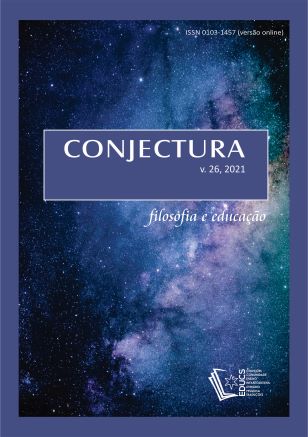Letramento, um termo em disputa? As contribuições do materialismo histórico-dialético para esse debate
DOI:
https://doi.org/10.18226/21784612.v26.e021027Resumo
O trabalho aqui desenvolvido apresenta algumas das reflexões realizadas durante o estudo de Mestrado, no qual nos propomos compreender, mais profundamente, as implicações do debate acerca do letramento na atualidade e seu reflexo nas práticas pedagógicas da escola pública, em especial, nas práticas elaboradas pelos professores da Educação do Campo. O esforço foi o de aproximar o debate do letramento aos pressupostos teórico-metodológicos do materialismo histórico e dialético, como ferramenta de análise e de compromisso propositivo com a educação dos filhos dos trabalhadores. Os caminhos aqui apresentados evidenciam o caráter de disputa, no qual o conceito de letramento vem sendo trabalhado ao longo da trajetória da Educação, como também, as formas sociais de utilização das quais ele vem sendo empregado nas escolas públicas do País. Compreendemos a utilização e o empenho, sobre o debate, do termo letramento, intensificado nas últimas quatro décadas, como fruto das necessidades colocadas à Educação em escala global e as exigências da atualidade do mundo do trabalho. Em contraponto, levantamos a importância de debater o conceito de letramento em seu sentido forte e radical, como capacidade de aprofundar a leitura da palavra e a leitura de mundo. Como nos termos de Freire, a capacidade de compreensão do mundo, juntamente com a aquisição da leitura e da escrita e de todos os conhecimentos historicamente acumulados pela humanidade, qualifica, portanto, o papel social que a Educação pública cumpre na vida dos sujeitos.
Palavras-chave: Letramento. Educação. Materialismo histórico e dialético.
Referências
BRASIL, Ministério da Educação. Pró-Letramento: Programa de Formação Continuada de Professores dos Anos/Séries Iniciais do Ensino Fundamental: alfabetização e linguagem. Brasília, 2008.
ENGUITA, Mariano Fernández. A Face Oculta da Escola: educação e trabalho no capitalismo. Trad. Tomaz Tadeu da Silva. Porto Alegre: Artes Médicas: 1989
FRIGOTTO, Gaudêncio. Educação e a Crise do Capitalismo Real. São Paulo: Editora Cortez, 2010.
FRIGOTTO, Gaudêncio. CIAVATTA, Maria. RAMOS, Marise. O Trabalho como Princípio Educativo no Projeto de Educação Integral de Trabalhadores. Caderno de Texto – 1ª Conferência Municipal de Educação de Contagem. http://www.contagem.mg.gov.br/arquivos/pdf/caderno_conferencia.pdf Acessado em 03/05/14.
FREIRE, Paulo. Conscientização. São Paulo: Editora Cortez & Moraes, 1979.
FREIRE, Paulo. Pedagogia do oprimido. Rio de Janeiro: Paz e Terra, 1970.
FREIRE, Paulo. Educação como prática da liberdade. Rio de Janeiro: Paz e
Terra, 1980.
IASI, Mauro Luis. Ensaio Sobre Consciência e Emancipação. São Paulo: Expressão Popular, 2011.
KOSIK, Karel. Dialética do Concreto. Rio de Janeiro: Editora Paz e Terra, 2011
KUENZER, AcaciaZeneida. Exclusão Includentee Inclusão Excludente:a nova forma de dualidade estrutural que objetiva as novas relações entre educação e trabalho. In: LOMBARDI, José Caludinei; SAVIANI, Dermeval; SANFELICE, José Luis (Orgs.). Capitalismo, Trabalho e Educação. 3º ed. Campinas/SP: Autores Associados, HISTEDBR, 2005.
LEITE, Sérgio Antônio da Silva; AMARAL, Cíntia Wolf do. O Processo de Alfabetização Escolar numa Perspectiva Crítica. Campinas, SP, v.2, v.1, out. 2000.
MARX, Karl. Sobre a Questão Judaica. São Paulo: Ed. Boitempo, 2010.
MARX, Karl; ENGELS, Friedrich. A Ideologia Alemã. São Paulo: Ed. Martin Claret, 2006.
MARX, Karl; ENGELS, Friedrich. Textos Sobre Educação e Ensino. São Paulo: Ed. Centauro, 2004.
SOARES, Magda. Letramento: um tema em três gêneros. 2ª Ed. Belo Horizonte: Autêntica, 2004.
SOARES, Magda. Alfabetização e letramento. 6. ed. São Paulo: Contexto, 2010.
TFOUNI, Leda Verdiani. Letramento e alfabetização. São Paulo: Editora Cortez, 1995.
Downloads
Publicado
Como Citar
Edição
Seção
Licença
1. A publicação dos originais implicará a cessão dos direitos autorais à revista Conjectura.
2. Os textos não poderão ser reproduzidos sem autorização da revista depois de aceitos.

Este trabalho está licenciado com uma Licença Creative Commons - Atribuição 4.0 Internacional.









